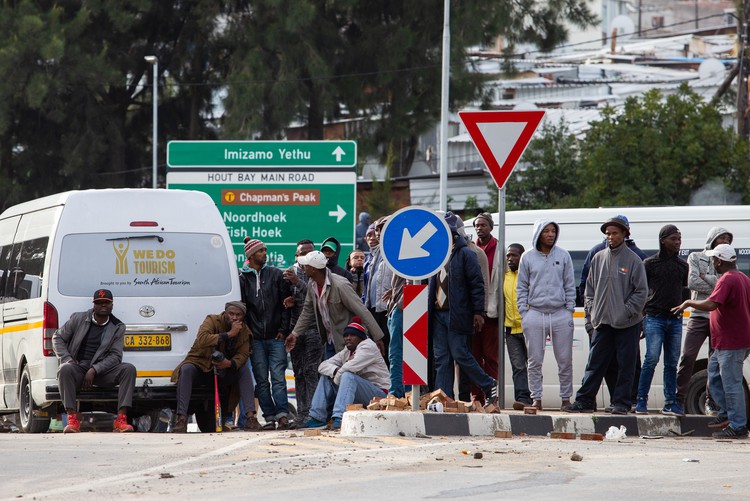
A protest over taxi routes in June 2018. Archive photo: Ashraf Hendricks
2 April 2019
Hout Bay taxi bosses say a battle over permits to operate the lucrative Hout Bay-Cape Town route left five taxi drivers dead over the last week and two commuters injured.
Last Thursday, a taxi driver working for Hout Bay Wynberg Taxi Association, which is affiliated to the Cape Amalgamated Taxi Association (CATA), was gunned down at the association’s offices in Imizamo Yethu. Four operators, believed to be from the rival Congress of Democratic Taxi Associations (CODETA), were gunned down on Monday, apparently in retaliation.
Provincial police spokesperson Captain FC van Wyk confirmed the deaths.
“A team of specialist detectives has been established to look into these murders. Several operations are currently underway in an effort to quell the violence. Arrests are yet to be made,” said Van Wyk.
Taxi bosses from the Hout Bay Wynberg Taxi Association are in hiding and agreed to speak to GroundUp on condition that their names not be revealed.
The association, founded in 1998, according to one operator GroundUp spoke to is situated in Imizamo Yethu. It has a fleet of approximately 100 taxis with about 40 owners.
The operators say numerous attempts to apply for the Cape Town–Hout Bay route have been fruitless.
Instead, they say, the City of Cape Town granted operating permits to another group operating under the banner of CODETA, which has a taxi rank near to the Hout Bay police station where Monday’s shooting took place.
The taxi boss who spoke to GroundUp said the owners who had been given the permit were not residents of Imizamo Yethu. “The City granted operating permits to wrong people. And then the MyCiTi project started and the City approached the very same people, not from Imizamo Yethu, and compensated them,” he said.
He said during the rollout and implementation of the MyCiTi feeder bus route the City had only negotiated with the CODETA-affiliated taxi bosses who were paid both to surrender their permits and to surrender their minibus taxis. But, said the operator, those taxi bosses had taken the compensation money and bought taxis all over again, much to the anger of the Imizamo Yethu taxi bosses.
Detailed questions about the issuing of permits sent by GroundUp to the City of Cape Town were acknowledged, but no response had been received by the time of publication.
In a statement late on Monday, Western Cape Transport MEC Donald Grant said the violence was believed to be related to disputes between associations.
He said the flaring tensions and past violence, driven by disputes over routes and illegal operations, prompted the provincial transport registrar to issue notices of suspension to the affected associations last week, for violation of the Code of Conduct for minibus taxi associations and operators.
Suspended associations would be allowed a hearing, he said.
“SAPS, Traffic and Metro Police prepared an integrated operational plan to stabilise the area in the short term and to maintain a heightened presence in the area over the medium to long term to root out illegal operators,” he said.